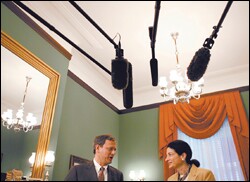With Senate hearings on U.S. Supreme Court nominee John G. Roberts Jr. scheduled to begin Sept. 6, several education groups said last week that they were content to wait on opining about whether the federal appellate judge should become the high court’s next associate justice.
Meanwhile, they’ve got plenty of summer reading in the thousands of documents from Judge Roberts’ legal career that the Bush administration has been releasing in recent weeks, under some pressure from Senate Democrats.
“We’re going to watch the process and are letting our coalition partners take the lead,” said Denise Cardinal, a spokeswoman for the National Education Association, in Washington.

One of those partners, People for the American Way, a liberal advocacy group based in Washington, is more than making up for the reticence of the teachers’ union. PFAW is calling on the administration to release yet larger quantities of documents written by Mr. Roberts during his stint in several legal positions in prior Republican administrations during the 1980s and early ’90s: in the attorney general’s office, in the White House counsel’s office, and as the principal deputy solicitor general in the Department of Justice.
Eliot Mincberg, the general counsel of People for the American Way, said the documents released so far suggest that Mr. Roberts has held “right wing” positions on a variety of issues in education, including the federal courts’ power to require busing to achieve school desegregation; affirmative action; school prayer; and sex discrimination. Judge Roberts’ views on those topics need to be aired during the confirmation hearings, Mr. Mincberg said.
“All those issues raise extremely serious questions that at a minimum need to be answered in terms of judicial philosophy,” Mr. Mincberg said.
In contrast to the skeptical tack taken by PFAW, the National School Boards Association, which frequently files friend-of-the-court briefs in Supreme Court cases, apparently is satisfied with the prospect that Judge Roberts, 50, will join the high court. (“Supreme Court Nominee’s Record Includes Legal Issues in Education,” July 19, 2005.)
The Alexandria, Va.-based group will not take a formal position on President Bush’s nomination of Judge Roberts to succeed retiring Justice Sandra Day O’Connor, said Thomas Hutton, a staff lawyer for the NSBA. Mr. Hutton cited a letter, however, that the association wrote to members of the Senate in 2003 praising Mr. Roberts’ judicial qualities when he was nominated to the U.S. Court of Appeals for the District of Columbia Circuit. “We stand by our letter,” Mr. Hutton said.
Like People for the American Way, Democrats on the Senate Judiciary Committee also are seeking more of Judge Roberts’ writings. In a letter submitted to the Bush administration last week, they asked for memos related to 16 cases from Mr. Roberts’ tenure as the principal deputy solicitor general under President George H.W. Bush. In addition to cases dealing with abortion, habeas corpus, and prisoners’ rights, the request includes significant cases related to school desegregation, sexual harassment in school, prayer at school graduation ceremonies, and foster care.
The senators’ letter states that the requested documents would help the committee prepare for the confirmation hearings.
Deference to Government
Commentators of all stripes agreed that the nominee’s legal papers hint at his great respect for, and even deference to, government authorities, including school districts. “His record has generally shown a deference to government, particularly with executive authority,” Mr. Mincberg of PFAW said. “We’ve certainly seen that in some of his decisions as a judge. How that translates in school contexts will depend on the circumstances.”
Such regard for government authority is related to another of Judge Roberts’ frequent themes: judicial restraint. The nominee sounded that theme last week, in an answer he submitted to a lengthy questionnaire to the Senate Judiciary Committee.
He wrote that “courts should not intrude into areas of policymaking reserved by the Constitution to the political branches.” And later, he wrote: “The proper exercise of the judicial role in our constitutional system requires a degree of institutional and personal modesty and humility.”
Judge Roberts continued, observing that judges “do not have a commission to solve society’s problems, as they see them, but simply to decide cases before them according to the rule of law.”
Such views worry John D. Trasvina, the senior vice president for law and policy at the Mexican American Legal Defense and Educational Fund, an advocacy and litigation group based in Los Angeles. The legal group represented nine undocumented-immigrant students in Plyler v. Doe, a Texas case that reached the Supreme Court in 1981.
In Plyler, on a 5-4 vote in spring of 1982, with Justice Lewis F. Powell Jr. casting the deciding vote, the Supreme Court held as unconstitutional a Texas statute that authorized local school districts to deny enrollment to immigrant children who had not been legally admitted into the United States.
Mr. Roberts, then a 37-year-old special assistant to Attorney General Smith in the Reagan administration, co-wrote a memo with a fellow special assistant, Carolyn B. Kuhl, discussing the case. It said that “the [Supreme] Court determined that Texas had failed to make a sufficient showing of a substantial government interest furthered by the statute” and suggested, had federal attorneys filed a brief supporting “the values of judicial restraint,” Justice Powell would likely have voted differently.
While it’s possible that the memo is “straight, general legal analysis,” rather than a sign of how Judge Roberts might now decide cases involving children’s access to public education, said Mr. Trasvina, who was a lawyer in the Clinton administration, “we want to know whether John Roberts believed the state of Texas had a substantial government interest in denying these children a public education.”
Since Judge Roberts was not directly involved in Plyler v. Doe, which in any event predated his stint in the solicitor general’s office, other of his writings on that case are not part of the request from Senate Democrats last week.




